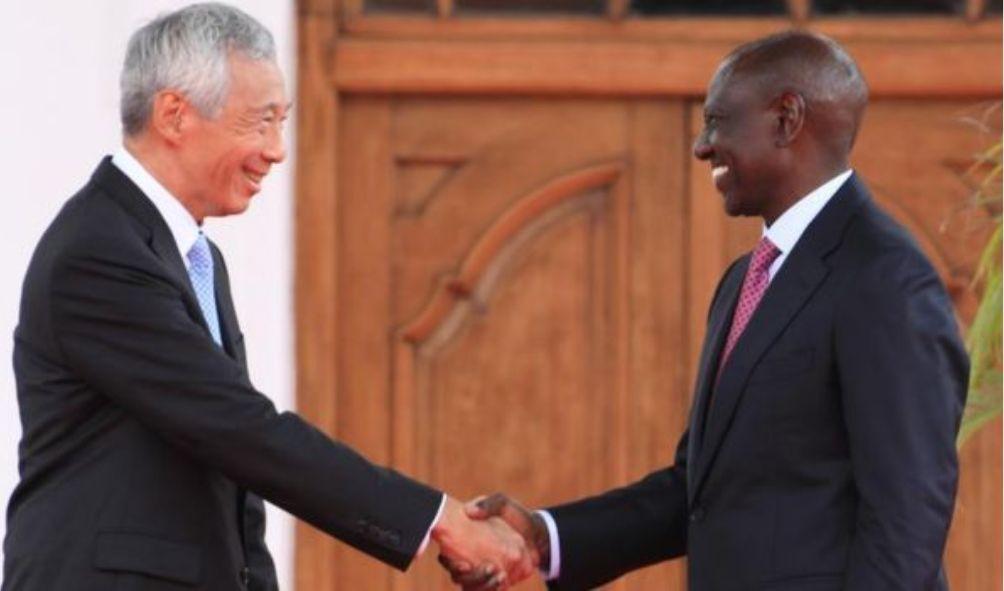Renowned US Economist Unveils Ruto’s Blueprint: Transforming Kenya into Africa’s Singapore
Kenya is frequently compared to Singapore, a prosperous city-state in Southeast Asia, for a variety of reasons, including both countries’ commitment to economic development and relatively stable governments.
Kenya has made significant strides in recent years toward enhancing its infrastructure, attracting foreign investment, and developing its technology sector.
Wednesday, June 14th, American Economist Tyler Cowen evaluated President William Ruto’s administration and various accomplishments over the years, concluding that the country could develop much faster than anticipated to become the “Singapore of Africa.”
In a Washington Post article titled Kenya Is Poised to Become the ‘Singapore of Africa,’ Cowen asserts that the East African nation is viewed as a potential economic powerhouse in Africa due to several factors.
Among these are a pleasant climate throughout the year and an area with a reasonable level of English proficiency. Despite negative shocks to imported food and energy prices, Kenya also had a growth rate of approximately 5.5% in 2022.
With growth rates between 4% and 5% since 2004, Cowen believed Kenya would continue to ascend.
Where in Africa could a comparable cluster of businesses develop? Unfortunately, some of Africa’s leading nations have recently encountered significant difficulties.
ALSO READ: President Ruto’s Debut Budget Unveils Key Highlights
Nigeria, Africa’s most populous nation, has only recently begun to implement much-needed reforms; Ethiopia, Africa’s second-most populous nation, has recently experienced a civil war; South Africa continues to be plagued by political issues and power shortages.
“For the time being, these locations are not in the running to become a dominant sub-Saharan economic hub, if only because ex-pats will be hesitant to move there,” Cowen remarked.
The American Economist who lectures at George Mason University added that the country’s population is young and growing, with a median age of 19; by 2050, the population is projected to reach 100 million.
Tanzania has a larger population than Kenya, but Kenya is much wealthier and has a superior infrastructure, he emphasized. Internet access, which is a component of Kenya’s digital infrastructure, is among the most dependable in Africa.
Under President Ruto’s policies demonstrating a strong commitment to education, with one of the best curricula in Africa, this large and youthful labor force could significantly boost the economy.
The literacy rate in Kenya is over 80 percent, and its universities are ranked among the best in Africa, according to Cowen. Kenya continues to attract foreign investment and develop its technology sector due to its educated labor force.
The American Economist stated, “In contrast, a location with a reasonable level of English fluency and a pleasant climate throughout the year will receive a great deal of attention, and this accurately describes Kenya.”
The country’s strategic position along the Indian Ocean is also crucial for international trade.
ALSO READ: Revolt Unveiled: Azimio MPs Stage Dramatic Exit as Treasury CS Presents Historic Budget Crafted by Ruto(Video)
The Mombasa and Lamu Ports were cited as major trade and transportation hubs in East Africa and across the continent.
“Coast countries are also better able to communicate with the rest of the world, and Kenya has relatively easy access to China and India, both of which are large markets and sources of capital.
Cowen stated that in the current geopolitical climate, East Africa attracts more interest from more sources than the majority of West Africa.
This strategic location can assist Kenya in becoming a major regional business and commercial hub.
The Economist asserts that Kenya could easily lead the entire African continent if the government maintains or increases its economic growth rate and stability.
Kenya must still address corruption, political instability, and regulatory barriers to market entry, making it difficult to attract foreign direct investment despite the positives.
Renowned US Economist Unveils Ruto’s Blueprint: Transforming Kenya into Africa’s Singapore
HEY READER. PLEASE SUPPORT THIS SITE BY CLICKING ADS. DON’T FORGET TO HIT THE NOTIFICATION BELL FOR MORE UPDATES AROUND THE GLOBE.
